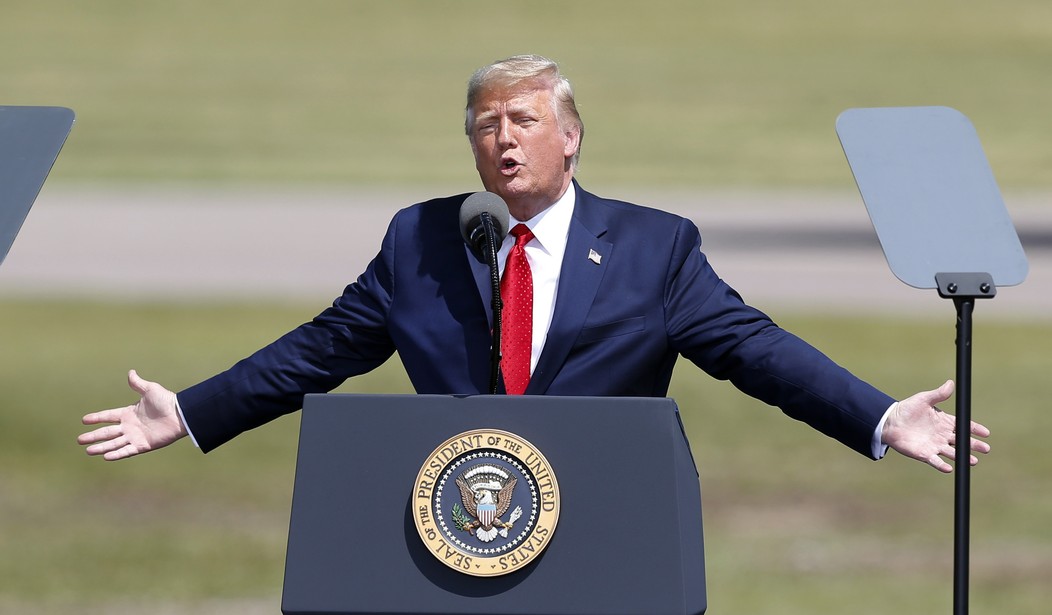Jason Reitman’s 2018 film, “The Front Runner,” has been playing a lot on cable recently. It’s the dramatization of Sen. Gary Hart’s brief 1988 presidential run, with Hugh Jackman playing the role of Senator Hart.
The film is striking for 2020 due to its portrayal of Hart as a policy-focused candidate, someone uninterested in the “frippery” of campaign politics. Striking, because the 2020 campaign seems to be much-less about the serious contrasts between this season’s “front runners” when it comes to policy than it is about image and style.
It was starkly summed up by “The Late Show Host” Stephen Colbert’s post-DNC monologue, in which he admitted that this election was about contrasts (Joe Biden overcoming challenges and having suffered in life, with President Trump, according to Colbert, never having to suffer), and essentially said that Biden’s acceptance speech was the “grown-up version of the college essay.”
The problem, of course, is that elections are not mere “college applications”—and to make that comparison undercuts the seriousness not only of the quadrennial presidential election, but the paramount importance of this election! It’s not about which candidate has suffered more or overcome more challenges… it’s about which candidate is offering policies that a particular voter supports!
In “The Front Runner”, Jackman’s Hart sums it up thusly in his campaign announcement speech, “I intend, as I always have, to run a campaign of ideas…Ideas have power, ideas are what governing is all about.”
By ideas, the writers of the film, via Hart, are really talking about policy (since this was one of the knocks on Hart before his scandal, that he was too focused on policy).
This is why, it’s not just Colbert’s patronizing look at “convention as college application” hot-take is so wrong. In that same monologue, Colbert takes issue with President Trump squandering (in Colbert’s view) precious public speaking time by “whining” about things like “shower pressure”.
Recommended
Shower pressure, low-flow toilets, the time it takes to wash a load of dishes in the dishwasher? These are issues of policy… and they’re issues the American voter actually cares about. They’re also issues that make a difference depending on who you vote for… since the Executive Branch, which POTUS presides over, actually makes those policies (and the Trump administration has).
Elections matter, and presidential elections manner with regards to the direction of those policies that are well-within the orbit of executive power. Regardless of what you might think about Joe Biden, given the historic stances of Democratic-led administrations on issues like these, you can not only guarantee that a Biden administration wouldn’t have made these policies more consumer friendly, his team would be appointing individuals to positions at agencies to ensure that there would be greater restrictions… and any reforms to these policies would be rolled back.
Also fully-within the orbit of the executive branch, of paramount importance in these volatile economic times, and of no less of a contrast, are what these candidates have done and will do on trade. At the earliest moment of Donald Trump’s 2016 presidential bid, he was well-ahead of other candidates in talking about the predatory practices of other nations when it comes to trade with the United States—undercutting the US on regulatory and labor costs, massively subsidizing agricultural sectors to undercut US crop prices, and imposing massive tariffs to keep US goods out of their marketplaces. Trump saw this for what it is, a kind of economic warfare.
Critics scoffed at then-candidate and later-President Trump for his proposals. President Obama had, despite promising to do so, failed to renegotiate NAFTA, and Hillary Clinton was put in the tough position of having to navigate a position on the trade deal that she had championed when her husband was president, and which the electorate largely had come to agree was a bad deal for America.
Those same critics were shocked and angry when Trump not only renegotiated NAFTA, but made movements to implement a trade posture that puts American interests ahead of her competitors abroad.
And so, while, according to Stephen Colbert, Joe Biden was putting the finishing touches on his DNC “college essay”, Donald Trump took the opportunity of the RNC to create another vital policy contrast, this time on trade (because Trump knows, all too well, that there is much more work to do on trade).
In addressing the RNC delegates, Trump once again called out our competitors in global commerce saying, “They’ve been taking advantage of us for years and years, and I’ve already done it in certain cases. We have countries that tariff us and we don’t tariff them. So they tariff us. It’s very simple. It’s called reciprocal. They tariff us, we tariff them.”
In a perfect world, our trading marketplace would be free of tariffs, free of subsidies, and we would be free to compete on quality and price (while working tirelessly on our regulatory burden, another issue the Trump administration has taken and represents a clear contrast with Team Biden). But our world isn’t perfect. It’s messy, with countries engaging in precisely the kind of behavior Trump talks about.
It’s why people continue to advocate for a strong trade posture from the Executive Branch, but why conservative lawmakers are pushing for legislation containing the principles enunciated by the President at the RNC, generally known as the “Zero for Zero” concept.
Gary Hart was right on at least one point in 1988, ideas are what governing is all about. Electing a President should be about which candidate’s policies you agree with more, and which candidate will appoint people who will implement those policies.
Whether it’s shower pressure, dishwashers, or making sure that American companies get a fair shake on trade, these are the things that really matter.
Andrew Langer is President of the Institute for Liberty.























Join the conversation as a VIP Member